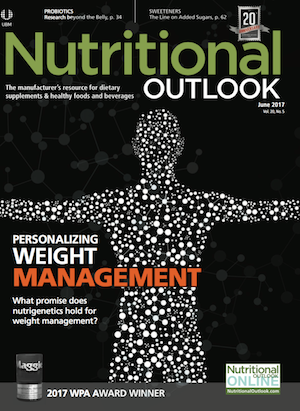Gottlieb’s Nomination as FDA Commissioner Clears Senate Committee Vote, Candidate Says He Supports Current Dietary Supplement Regulations
NPA and CRN now officially support Gottlieb’s nomination as FDA Commissioner, with Fabricant calling for Gottlieb's “swift confirmation.”
Photo © iStockphoto.com/baurka

Scott Gottlieb, MD, is a step closer to becoming head of FDA. Today, in a 14-9 vote, the Senate Committee on Health, Education, Labor, and Pensions (HELP) approved Gottlieb’s nomination as FDA Commissioner. Gottlieb’s nomination will now advance to a full Senate vote.
Mike Greene, senior vice president, government relations, for the Council for Responsible Nutrition (CRN; Washington, DC), told Nutritional Outlook that the full Senate vote could happen as soon as within the next two weeks and likely before the end of May.
Earlier this month, the HELP committee questioned Gottlieb during a committee hearing. Much of the questioning focused on Gottlieb’s former ties to businesses in the pharmaceutical industry, but Senator Orrin Hatch (R-UT) asked a question of Gottlieb related to the dietary supplements industry.
Hatch has asked a similar question to past FDA Commissioner nominees, essentially inquiring whether nominees feel that current regulations overseeing dietary supplements-namely the Dietary Supplement Health and Education Act of 1994 (DSHEA)-provides FDA with adequate authority for regulating dietary supplements.
During Gottlieb’s HELP hearing, Hatch asked the same general question to the nominee: “Every day, millions of Americans safely take one or more dietary supplements. As consumers continue to take greater control of their health, it is important that they have access to safe products that fit their needs. The FDA currently has the oversight authority to remove any product it finds is unsafe and to take enforcement action to remove the product from the market. Dr. Gottlieb, do you believe the FDA’s current regulatory framework under DSHEA provides for adequate enforcement tools to remove unsafe dietary supplements from the market?”
In response, Gottlieb answered: “As someone who uses dietary supplements every day, I believe they serve an important role in health promotion for millions of Americans, and I support consumer access to these products. I believe the regulatory framework established under DSHEA is the right one, and if confirmed, I would commit to enforcing DSHEA, as intended by Congress.”
Past FDA commissioner nominees have also said they support DSHEA, but Gottlieb’s answer stands out because the nominee said that he not only personally uses dietary supplements, but also views supplements as playing a role in healthcare.
“I think generally, with regards to supplements, [the response] we get from either commissioners or acting commissioners is more of, ‘Hey, we’re going to uphold the law,’ and he certainly said that, which we’re very supportive of. We want to see the law upheld, too,” says Dan Fabricant, PhD, CEO and executive director of the Natural Products Association (NPA; Washington, DC). “But he also seemed to say, ‘Hey, there may be a role here for supplements to help this country in its healthcare system.”
Fabricant added that this position aligns with NPA’s own priorities of expanding consumer access to dietary supplements through programs like Flexible Spending Accounts (FSA), Health Savings Accounts (HSA), and the federal Special Supplemental Nutrition Program for Women, Infants, and Children (WIC). “There are things like that where we know that supplements can play a role, and we’re encouraged by the fact that there seems to be some receptivity to that” in Gottlieb’s comments, Fabricant adds.
Greene says CRN was also happy with Gottlieb’s words. “We were so pleased to see his response that he uses dietary supplements every day and feels like DSHEA is a good law, that it gives FDA the tools to enforce the dietary supplement industry,” he says. He says that Gottlieb’s support of consumer access to supplements is likewise positive. “It reminds us that over 170 million Americans take dietary supplement products every year. I think that’s something [CRN] has been very good at in terms of sharing information on Capitol Hill, but it’s good to hear it from Scott Gottlieb, as well.”
NPA and CRN now officially support Gottlieb’s nomination as FDA Commissioner, with Fabricant calling for Gottlieb’s “swift confirmation.” Both Fabricant and Greene say that Gottlieb’s experience at FDA is a benefit. Gottlieb served as FDA Deputy Commissioner in 2005–2007 during the George W. Bush administration. Prior to that, he served as senior advisor to FDA Commissioner Mark McClellan, MD, and as the FDA Director of Medical Policy Development. He is currently a practicing physician and a Resident Fellow at the American Enterprise Institute, a nonprofit, nonpartisan think tank for issues including economics, education, and health care.
“We’re very optimistic,” says Fabricant. “I think it’s good in general for the agency to have somebody who understands industry and also understands the FDA. This would be Dr. Gottlieb’s second trip at FDA. He knows the agency very well. He also has done quite a bit with different FDA-regulated industries. So I think that makes him very unique in that regard but also very good at the balance that needs to be struck.”
When asked whether he feels Gottlieb would seek to impose stricter regulations or greater FDA authority over dietary supplements, Fabricant says, “I don’t anticipate him wanting to see a change in the laws. I just think he may want to see them being actively enforced, which I think we all do.”
Greene answers the question this way: “I think it’s too early to say that. What we know about Scott Gottlieb is that he’s a smart, dynamic leader. He certainly understands dietary supplement issues, but I don’t know that we could be so bold as to say that.”
As promising as Gottlieb’s statements are for the dietary supplements industry, both Fabricant and Greene say the industry has no reason to assume that Gottlieb as FDA Commissioner would be in any way lenient on the sector.
“There’s no free pass here,” says Greene. “We have to work hard here, just like everyone else, to talk about our policy goals and to talk about the things we’re moving forward.”
Fabricant agrees. “His positive statements don’t get rid of our critics, but at the same time, they do, I think, open the door for those discussions.”
When asked what he hopes Gottlieb would prioritize if he does take over as FDA Commissioner, Fabricant says, “I think the biggest things in terms of our industry and probably others is just making sure that the appropriate resources are being used appropriately-you know, that there is X budget allocated for inspections, and are we getting that number of inspections? If X is the amount allowed for re-inspections, are we getting that number of re-inspections? So those are the first things: let’s really take an accounting of what’s out there, what’s happening. And then from that, go from there.”
Greene says he’d like to see Gottlieb devote attention to the supplements industry specifically. “I think when you look at all the other issues that exist out there and certainly all the priorities that FDA has to focus on, they don’t always spend a lot of time on dietary supplements,” he says. “I’d like to see more activity on enforcement of dietary supplements, particularly for problem products on the market, and potentially see more of a focus on specifically educating inspectors on the importance of dietary supplement GMPs during their inspections.” He also says he thinks Gottlieb would work to ensure the recently instituted FDA Office of Dietary Supplement Programs remains in place, despite any potential future budget cuts.
Of course, Greene acknowledges, “I do know that actions speak louder than words. We’re really happy with some of his words.” But how Gottlieb will deal with the dietary supplements industry if and when he becomes FDA Commissioner remains to be seen.
Also read:
Jennifer Grebow
Editor-in-Chief
Nutritional Outlook magazine
jennifer.grebow@ubm.com

HHS announces restructuring plans to consolidate divisions and downsize workforce
Published: March 27th 2025 | Updated: March 27th 2025According to the announcement, the restructuring will save taxpayers $1.8 billion per year by reducing the workforce by 10,000 full-time employees and consolidating the department’s 28 divisions into 15 new divisions.















